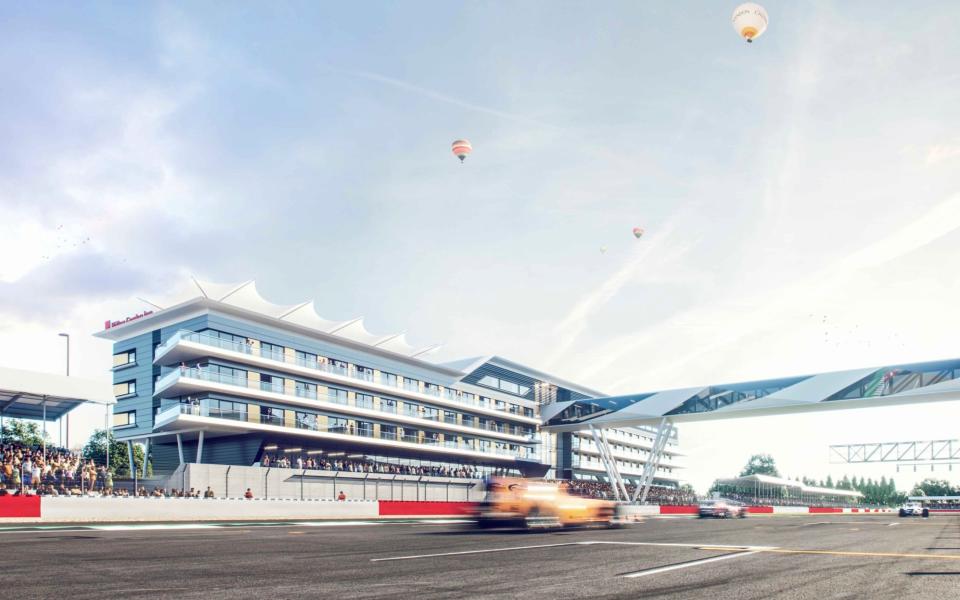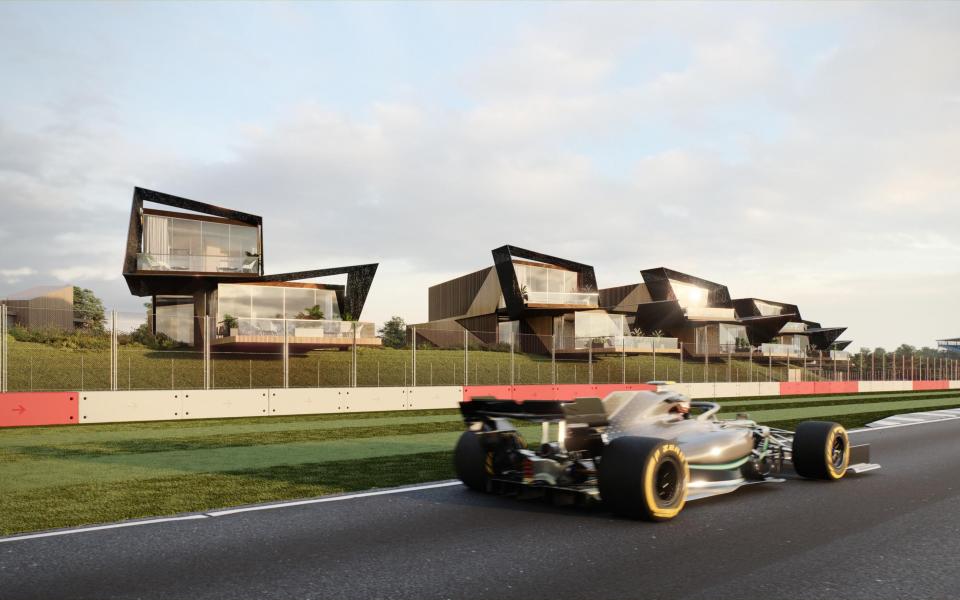How Silverstone plans to secure another 70 years of history in difficult financial climate

Anyone who watched last weekend’s British Grand Prix on television, or is following the action at this weekend’s 70th Anniversary Grand Prix, may have noticed a large, half-finished building, covered in scaffolding, looming over the start-finish straight. It is a 197-room Hilton hotel, which is due to be completed by next summer. Silverstone’s owners hope it is going to revolutionise this place.
Formula 1 has been celebrating its 70th birthday this week. The anniversary has provided an opportunity to look back with misty eyes on seven decades of thrills and spills at this historic track, which hosted F1’s first race in May 1950. But the truth is there have been times, particularly in the last 20 years, when the numbers have not added up; when Silverstone was very close to going under. So exorbitant was the cost of staging F1, with Bernie Ecclestone’s famous ‘escalator fees’ built into the contracts, that even with 300,000-plus people turning up over the race weekend, the circuit barely turned a profit.
The trouble was, without the grand prix, Silverstone generated virtually no revenue at all. It made negotiating rather tricky. “It was, shall we say, well known,” says Stuart Pringle when asked whether Ecclestone had the circuit ‘over a barrel’ at contract renewal time.
A former Secretary of the British Racing Drivers’ Club, which owns and operates Silverstone, Pringle is now the managing director of Silverstone Circuits Ltd. Since taking over the reins three years ago, it has been his job to put in place a plan to reduce the historic reliance on the grand prix; to secure the next 70 years of history.
The way to do that, he says, is by diversifying Silverstone’s revenue streams. That is where the hotel comes in. The previous management had already had the idea to use Silverstone as a conference venue. The Silverstone Wing, a gargantuan facility, was opened back in 2011 when the pits straight was controversially moved to between Club and Abbey corners. The problem was, there was nowhere for all these hoped-for businessmen to stay. “The No 1 reason for cancelled conference and exhibition business is lack of accommodation,” says Pringle.
The Hilton Garden Inn Silverstone - which will have a bridge over the top of the track, connecting the hotel to the Wing - should change all that.
Silverstone will not actually make much money from the hotel itself. Occupants of the rooms, many of which will double as hospitality boxes, will be required to buy a ticket if staying over race weekends. But basically Silverstone sold a long lease to a private developer who appointed Hilton as operators. What it should do, though, is ensure a steady stream of visitors all year round. And once they are there, the hope is they will sample all that Silverstone has to offer.
That list of attractions is growing. The Silverstone Experience, a new immersive museum/educational centre, was opened earlier this year by Prince Harry and Lewis Hamilton. Covid hit two weeks later, forcing it to shut again. But it is now back up and running and receiving rave reviews.

A go-kart track, plus simulators and an e-Sport centre are also on Pringle’s wishlist, although he is careful to stress that Silverstone is not looking to create an international kart track.
“There’s no point in replicating the historic problem that we’ve had with the main circuit,” he says. “Namely, that you build what is effectively a grand prix circuit for karts which then can’t be used cost-effectively for other activities. Any track would need to sit as part of an offering that works well for corporates, stag nights. But yes, it’s on the wishlist. BRDC president David Coulthard is certainly very keen. He has a son of karting age.”
There are also 60 short-stay luxury accommodation lodges in the process of being built on the approach to Maggots, 20 of which will have “stunning trackside views”. The biggest four-bedroom units are priced at £1.6 million while all residents will have access to a central clubhouse, pool and gym. “It’s basically Soho House for petrolheads,” Pringle says. “Although the units will not be inaccessible for ‘normal people’ outside of the major events. Yes, on a grand prix weekend they will look like the yachts on the harbour at Monaco. But out of season, if you want to come up and do a track day, or a driving experience, it should be affordable enough.”

The idea, Pringle says, is to create a “52-week a year operation” at Silverstone, with enough year-round attractions and entertainment to satisfy not only petrolheads but families too. Bicester Village Shopping Centre, he points out, is just down the road. It attracts seven million visitors a year.
Covid has been a major setback. But Silverstone is still debt-free as things stand. The worry is next year’s race is cancelled too. The implications of that hardly bear thinking about. Pringle, though, is broadly positive. “It’s like a game of Snakes and Ladders,” he says. “We’ve just scaled some very daunting ladders and now we are descending a very long snake. But fundamentally the brand is great, the track is world-class, we’ve got Lewis at the top of his game, we’ve got property developers who want to invest money on our site...there is a lot to be optimistic about.”

 Yahoo News
Yahoo News 